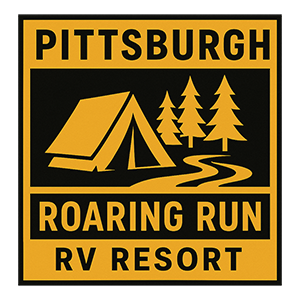Winter RVing in Western Pennsylvania can be incredibly peaceful — snow-covered hillsides, quiet campgrounds, frosty morning walks, and crisp mountain air. But with all that beauty comes a major challenge: freezing temperatures that can quickly damage your RV’s pipes, tanks, and water systems.
When temperatures drop below freezing, water expands, hoses stiffen, and seals contract — making your RV vulnerable to leaks, ruptured pipes, and expensive repairs. The good news? With the right preparation (and a few smart habits), you can prevent freezing issues entirely and enjoy cold-weather RVing comfortably all winter long.
Whether you’re parked for the season at Pittsburgh Roaring Run RV Resort or heading out for a winter weekend, use this guide to protect your RV from the cold.
Why RV Water Systems Freeze So Easily
RV plumbing is more exposed than household plumbing. Many rigs have water lines running along the underbelly, behind thin walls, or inside shallow cabinets. Even fully insulated RVs struggle in temperatures below 25°F, especially during long stretches of cold weather.
Common freeze points include:
- Fresh water hoses
- Exterior water hookups
- Tanks and dump valves
- Interior pipes near walls or floors
- Shower and kitchen P-traps
A frozen pipe can stop your water flow — but a burst pipe can cause leaks inside your walls or floor, leading to costly repairs. Prevention is always easier than cleanup.
Insulate Everything That Carries Water
Insulation is your strongest defense against freezing. Start with the areas that lose heat fastest:
Fresh Water Hose
A heated water hose is essential for winter RV living. It prevents ice buildup inside the hose and keeps water flowing reliably.
Exterior Spigot
Even if the park provides frost-free hydrants, wrap the spigot and connection point with insulated covers to keep cold air from reaching your hose.
Sewer Hose
While gray and black tanks shouldn’t be left open in winter, insulate your sewer hose for the times you do need to dump.
Interior Pipes
If your RV has pipes running behind cabinets or near the floor, add foam pipe insulation to protect them from cold drafts.
For a complete winter setup, see our Winter RV Packing Checklist for all the insulation supplies you’ll need.
Use Heat Where Insulation Isn’t Enough
When temperatures stay below freezing for long periods, insulation alone may not keep water lines warm enough. Add supplemental heat to vulnerable areas.
Tank Heating Pads
Attach 12V or 120V heating pads to your fresh, gray, and black tanks. They keep water from freezing even during single-digit temperatures.
Heat Tape
UL-approved heat tape can be safely wrapped around rigid pipes (never soft hoses) to prevent freezing.
Heated Storage Bays
If your RV has an enclosed underbelly or wet bay, use a small, thermostat-controlled heater to maintain safe temperatures.
Interior Cabinet Heating
For sinks on exterior walls, leave cabinet doors open to allow warm air to circulate.
Protect Your RV’s Underbelly
Cold air under the RV is one of the biggest causes of freezing lines and tanks.
Skirting
RV skirting (vinyl, foam board, or inflatable options) blocks cold wind and traps warmer air under the RV. This can raise underbelly temperatures by 10–20 degrees.
Ground Insulation
Snow, ice, and wind can rob heat from your RV. Laying foam board or carpet remnants on the ground under your RV adds an extra thermal barrier.
Seal Drafts
Check around slide-outs, pipes, and access panels for gaps. Cold air entering these areas can quickly freeze plumbing.
Manage Your Water Wisely in Freezing Weather
How you handle your water can dramatically reduce the risk of freezing.
Use Your Fresh Water Tank Instead of Hookups
Instead of keeping your RV connected to the campground spigot 24/7, fill your fresh water tank and disconnect. This removes your hose from the equation entirely — the hose is usually the first thing to freeze.
Only reconnect when you’re ready to refill.
Keep Gray and Black Tank Valves Closed
Leaving your valves open during winter creates a slush-like buildup in your sewer hose. Always keep valves closed and dump only when tanks are at least two-thirds full.
Add RV Antifreeze to P-Traps
Pouring a small amount of non-toxic RV antifreeze into sinks, showers, and toilets prevents freezing inside pipes and P-traps.
Run a Trickle of Water (Only in Extreme Cold)
A slow drip can keep water moving enough to prevent freezing. Use this method sparingly — it fills tanks faster.
Maintain Warmth Inside the RV
Interior warmth protects interior plumbing. A well-heated RV reduces the chance of cabinet lines or bathroom pipes freezing overnight.
Use Efficient Heaters
Oil-filled radiators, ceramic heaters, and infrared heaters provide steady warmth. They also reduce propane usage.
Insulate Windows and Vents
Cold air sneaks in through glass, skylights, and vents. Reflective insulation reduces heat loss.
Use Rugs and Thermal Curtains
They keep floors warm and help maintain interior temperatures.
For more tips on staying warm, see RV Living in Winter.
Keep Up with Preventative Maintenance
Some winter problems aren’t caused by freezing — they’re caused by missed maintenance.
Check the basics regularly:
- Test your water pump
- Inspect seals and water connections
- Verify that heating pads are working
- Ensure propane valves and regulators function properly
- Clean furnace filters
- Inspect your underbelly for cracks or gaps
For more upkeep tips, visit RV Maintenance Essentials.
Plan Ahead for Extreme Cold
Western Pennsylvania occasionally experiences “deep freeze” stretches where temps dip into the single digits for days. In these conditions:
- Keep your freshwater tank at least half full (more water = slower freezing)
- Run your furnace overnight to warm the underbelly
- Minimize use of outside hoses
- Add additional insulation inside cabinets
What to Do If Something Freezes
If you notice slow water flow or no flow at all:
- Turn on your furnace to warm the RV interior
- Open cabinets to allow warm air to reach pipes
- Use a space heater near accessible plumbing (never leave unattended)
- Warm frozen hoses indoors — never with open flame
- Inspect for leaks after thawing
If the freeze occurred inside the underbelly and you can’t access the lines, contact a mobile RV technician.
Winter RVing Without the Worry
Preventing freezing issues comes down to three things: insulation, heat, and smart water management. Once your RV is properly equipped, winter camping becomes easy — and incredibly rewarding. Snowy mornings feel peaceful, campgrounds are quiet, and the Laurel Highlands and Pittsburgh region offer beautiful winter recreation.
Enjoy a Freeze-Free Winter at Pittsburgh Roaring Run RV Resort
If you’re planning to spend the season in your RV, Pittsburgh Roaring Run RV Resort offers the perfect winter home base with full hookups, plowed access roads, and a welcoming community.


